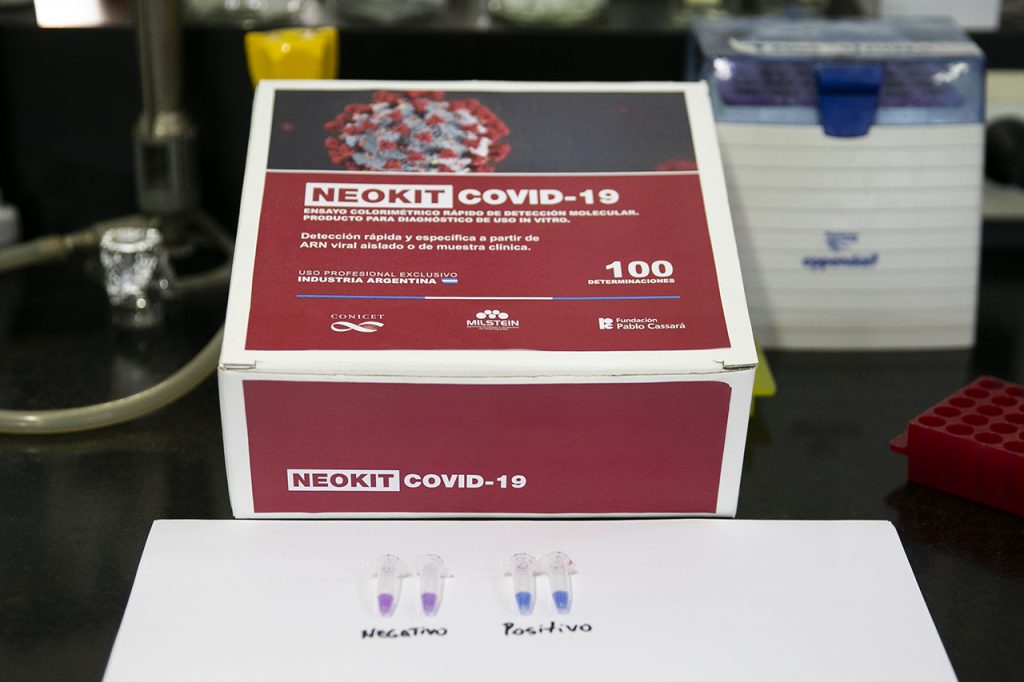Five Argentinean scientists from the Institute of Science and Technology of the state-owned National Council of Scientific and Technical Research of Argentina (CONICET) developed a rapid test to detect the coronavirus SARS-Cov-2 at the molecular level, as an additional option to PCR tests.
Argentina, officials say, is studying the export of NEOKIT-COVID-19, as the test is called, EFE reported. According to an interview by Thomas Blanco of El Espectador, Carolina Carrillo –one of the creators of the device along with Adrián Vojnov, Santiago Werbajh, Luciana Larocca and Fabiana Stolowicz—said they will be able to carry out up to 400,000 tests per month in the country.
The NEOKIT-COVID-19 is capable of detecting the virus on the second day of infection, even in asymptomatic people, Carrillo said. “That’s its advantage: by the second or third day you have a detectable viral load. That’s one of the benefits of molecular testing. This kit does not replace RT-PCR either, it adds up. Because, at least in our country […], there are places that have the capacity and others that don’t have the capacity for laboratory testing. If there is the possibility of RT-PCR, let it be done, and in those that do not, this is a solution. Seeing the panorama with its complexity makes the tools not exclusive but inclusive,” the scientist told El Espectador.
BBC Mundo’s Analía Llorente also interviewed Carolina Carrillo. The fact that this is a molecular-based test, Carrillo explained, means that it detects the presence of the virus as soon as the sample is taken. “Serological tests, rapid tests, identify whether the person has antibodies against the virus, but do not tell us if the person is infected at the time,” the scientists explained.
In tests that detect antibodies the organism is slow to respond and false negatives can appear, “while the molecular methods detect the genetic content of the virus, they are very fast and effective,” Carrillo also told Francisco Reyes of Infobae.
“And NEOKIT is quick to detect because in one hour, unlike PCR which needs at least four hours, you have the result to know if the virus is present,” she added to BBC Mundo.
To perform the test, a sample of purified Ribonucleic Acid (RNA) is taken from the patient’s nasopharyngeal, oropharyngeal, sputum and saliva swabs, Reyes reports for Infobae.
“A swab comes with a lot of junk like mucus, saliva, yeast… etc., so you need a purification to keep the sample that has the genetic material of the virus, which is an RNA (ribonucleic acid) molecule,” Carillo explained BBC Mundo.
The purification, she added, is done outside the kit and lasts one hour.
According to a press release by CONICET, the purified RNA sample is put in a solution that contains reagents and dyes. The color of the solution is violet. The tube is closed and incubated at a temperature of 64 degrees for 60 minutes. If, when uncovered, the mixture remains violet, the result is negative; if it turns into light blue, it is positive.

Like PCR, this kit has up to 98% match. “In clinical studies we had similar parameters to PCR with 100% specificity and 100% sensitivity. In the study, the samples that gave us discordant results had been badly stored, which gives us 94 to 98% specificity taking into account the condition of the samples. This gives us peace of mind because the kit is too easy to use and the important thing was to be sure that it would always work well,” Carrillo told El Espectador.
The CONICET press release reports that this specificity of the test also minimizes the likelihood of false positives. The test identifies four different regions of the SARS-CoV-2 genome that are inherent to this type of coronavirus.
And it does not require such expensive equipment. The reagents are cheaper, the scientist says. That is why the kit costs eight dollars, compared to the 15 to 24 dollars that, at least in Argentina, PCRs cost, she says.
“The advantage of the kit we developed with respect to the use of the RT-PCR technique is that, although it has the same sensitivity and precocity to detect infection, it offers results with greater speed, requires much less expensive and complex equipment, is very simple to maneuver and its results are easy to interpret, so it is not necessary for highly qualified personnel to handle it,” Adrián Vojnov, one of the team’s scientists, added as quoted by the Conicet’s press release.
On May 29, when Blanco published the interview in El Espectador, Carolina Carrillo assured that her team was preparing a first batch of 10,000 tests, and that they plan to produce up to 400,000 a month from now on, 200,000 every 15 days, she said.
“There are some proposals to produce the inputs, which is necessary to favor the country’s industry and to lower costs,” Carrillo said.
The first batch will be used to supply Argentinian hospitals, EFE reported.
Argentina’s Science, Technology and Innovation Minister Roberto Salvarezza said that the government is also evaluating the possible export of NEOKIT-COVID-19. “We have received requests for these countries to validate it. They have asked us for about 500 determinations (tests). We have received orders for these countries to validate the test. They have asked us to make 500 tests,” he said, according to EFE. He did not specify which countries made the requests.
The report adds that the government will plan exports after meeting domestic demand, “in case the countries concerned validate the product.”
Fotos: CONICET and Argentina’s Science, Technology and Innovation’s Twitter account
